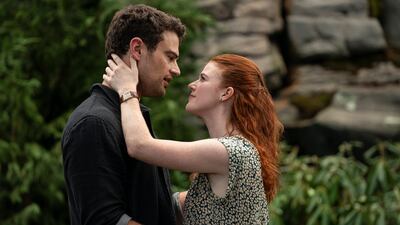May has already been a busy month for fans of time-travelling heroes on TV, with the announcement that Ncuti Gatwa would be taking on the role of the 14th incarnation of Doctor Who dominating news columns around the world. It seems timely then, excuse the pun, that a man inextricably linked with the much-loved Time Lord should resurface at the forefront of another big-budget time travel adventure, before the excitement over the latest Doctor has even had a chance to die down.
Steven Moffat is synonymous with the Doctor. He spent 12 years, from 2005 to 2017, on the show in roles from writer to showrunner and executive producer, and picked up a sizeable collection of Baftas, Emmys and Hugo Awards for his efforts. Even as early as 1995, the Scottish scribe was contributing to novels and short stories that followed the adventures of the heroic time traveller.
Who better, then, to script HBO’s new adaptation of Audrey Niffenegger’s best-selling novel The Time Traveler’s Wife than Mr Time Travel himself? Of course, Moffat has had plenty of success outside of the time travel genre too, not least as creator of the multi-award-winning, Benedict Cumberbatch-starring TV adaptation of Sherlock, but something seems to keep drawing him back to time travel.
“I love time travel. It's a different way to look at your life by putting it in a jumbled up order,” he tells The National. “Time travel allows you to see that love and loss are inextricably linked, that one entails the other, which I think is a vast thing.
"It means that happiness means sadness. It means togetherness means being apart, light means shadow, all those things.”
Beyond this deeply philosophical take on the appeal of the theme of time travel, Moffat admits that another part of the attraction is much simpler — its unattainability.
“You and I cannot go to yesterday or last week. We can’t go into the next 100 years, unless we live for an unconscionable amount of time, and travel to places we can never go is particularly exotic to us," he says. "Wouldn't it be great to go and see yesterday again? Wouldn't it be great to go and listen at the next table to your first date with the love of your life, and find out what you actually said? Maybe even see what she might have liked about me because that's always been a mystery to me?”

Just as Moffat seems to be warming to the topic of time travel, he takes the kind of unexpected exit road that will be familiar to fans of his previous work. The Time Traveler’s Wife, a love story about Henry (Theo James), a man with a genetic disorder that causes him to time travel unpredictably, and Clare (Rose Leslie), the wife who has to cope with his frequent disappearances, isn’t really about time travel at all, he insists.
“The adventure is the love story, and the time travel is the interruption,” he explains. “He's not like Doctor Who, he doesn't run around saving people or solving crimes. He just wants to get back home to Clare, and the story is what's happening between the two of them.”

As the writer delves deeper into what, for him, is the real story of the show, a somewhat unexpected side of his character begins to surface. Moffat is known for high-concept, fairly dark, sci-fi. He says he thinks people assume he's much meaner than he is — an impression he blames on the “sardonic face" he was born with. But, he insists, he's actually something of an incurable romantic at heart.
“Clare has a strange dichotomy, but one she quite likes,” he reveals. “She likes this guy and she’s in love with this guy, but at the same time she doesn't like being told ‘that's your future.’ She thinks ‘I’ll decide for myself what my ruddy future is and you will not tell me.’”
For Moffat, the most important theme of the show is not time travel then, but the utter lack of control we all have over how when and with whom we fall in love.

“There's a line, I think at the beginning of Chapter Four, when Henry says ‘everybody's got to have agency.’ Well let me tell you about falling in love — no one has any agency, that's why they call it ‘falling’,” he says. “When you meet 'the one', and I hope you have, there’s loads of things going on in your heart and your mind and your soul.
"It's the most exciting moment of your life, but you simply have no choice. You're not consulting a checklist and saying ‘well, good income, the correct height, likes the same movies as me.’ You just suddenly think ‘oh, it's you. I don't know why it's you, but it's you.’ I remember that when I met 'the one'. I just knew so quickly, and I think most people do.”
It's certainly not the emotional response you'd expect from a man best known for stories about marauding, malevolent aliens hell bent on destroying Earth. But Moffat hasn’t completely let the darkness go, it seems.
“Films and TV shows usually end when the couple gets married and live happily after,” he says. “We wanted to go beyond that point and see what happens next.”
The Time Traveler’s Wife streams on OSN+ with new episodes dropping every Monday

